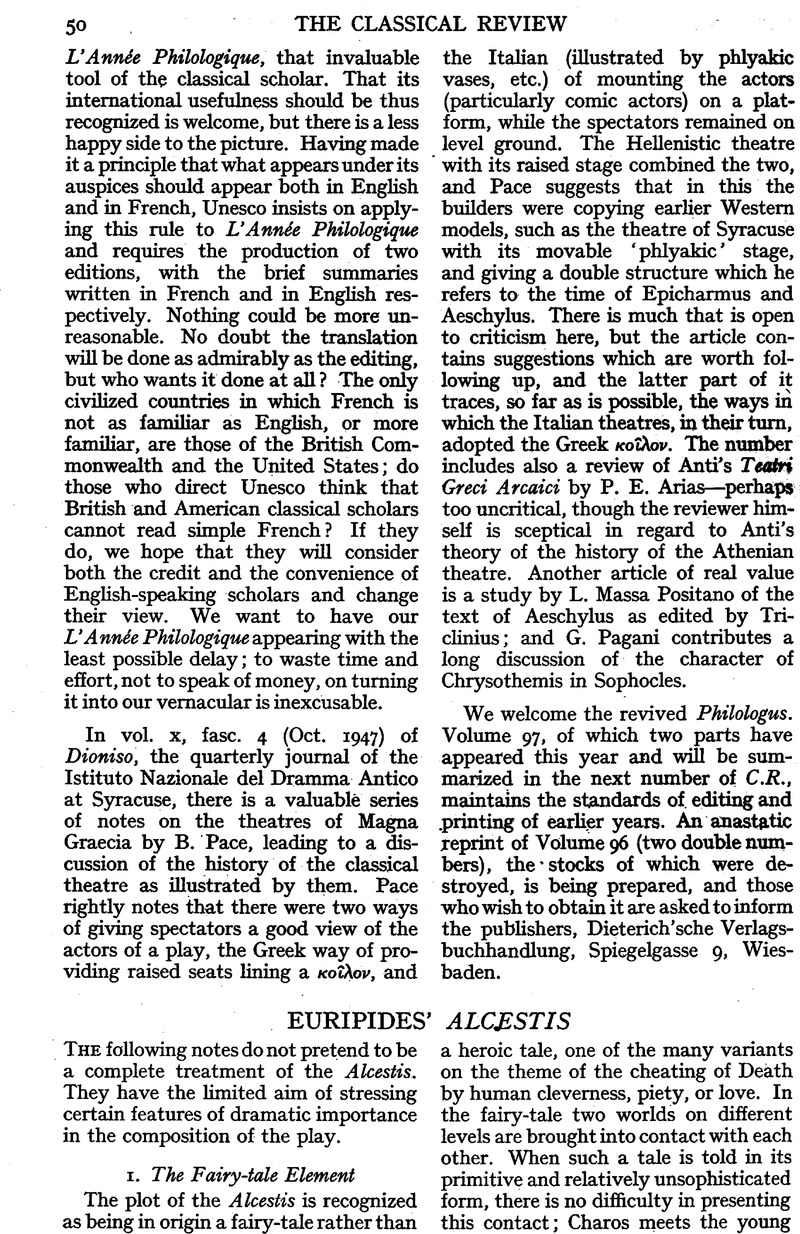No CrossRef data available.
Published online by Cambridge University Press: 27 October 2009

page 51 note 1 I assume that the δ⋯σποινα of 163 is Hecate; cf. Med. 397. For the Καλ⋯ Μοῖρα see Pernot, Recueil de textes en grec usuel, pp. 66 and 74: ἄξαφυα ⋯υο⋯γει ⋯ γωυι⋯ το⋯ σπιο⋯ κα⋯ βγα⋯υει ⋯ Kαλ⋯ Mοῖρα.
page 51 note 2 Cf. Xen. Hell. vi. 1. 3 on Polydamas of Pharsalia: ἠυ δ⋯ κα⋯ Ǵλλως φιλ⋯ τε κα⋯ μεγαγοπρεπ⋯ς τ⋯υ Θετταλικ⋯υ τρ⋯που.
page 51 note 3 This insistence on the Thessalian setting is well brought out by Weber in the introduction to his edition of the Alcestis.
page 51 note 4 In 966–8 the reference is, as Professor T. B. L. Webster has kindly pointed out to me, to Orphism rather than to the legend of Orpheus.
page 51 note 5 The tales of Orpheus, Alcestis, and Protesilaus are similarly connected by Lucian, Dial. Mort. 23. 3.
page 52 note 1 As the MSS. stand, Alcestis calls the figure she sees ῐιδας. Since the carrying-off of the dead seems in this play to be the function of Death (47, 49, 73–6, and 870–1 suggest the duty of Θ⋯νατος and his relation to ῐιδης), the conjecture ἆ δ⋯ is tempting.Perhaps too great exactitude should not be demanded in an hallucination. Ἀῒδας and Charon are again mentioned together in 438–41. By 268 Alcestis has come to herself, and the Ἅιδας of that line is merely the common poetical equivalent for θ⋯νατος.
page 53 note 1 I am grateful to Professor R. E. Wycherley for this suggestion.
page 54 note 1 Without treating the textual problem in detail, It may be noted that the above interpretation assumes (and is an argument for) the genuineness of 287–9, which some critics (e.g. Earle, M. L., C.R. xviii (1904), p. 336) have rejected.Google Scholar
page 54 note 2 Note the abruptness of the end-stopped lines, 629–33.
page 54 note 3 Cf. Pohlenz, , Griechische Tragödie, pp. 246–247.Google Scholar
page 55 note 1 A fourth anticipation of less importance and different character in the serving-woman's speech occurs at 210 οὐ γ⋯ρ τι π⋯υτες εὖ φρουο⋯σι κοιρ⋯υοις, which prepares for Admetus' words in 954 ⋯ρεῖ δ⋯μ' ὅστις ⋯χθρ⋯ς ὣυ κυρεῖ τ⋯δε. For dramatic reasons the Chorus must take the earlier view held by Admetus, and Euripides, always careful to leave no loose ends, thus suggests that other Pheraeans might take a different view of Alcestis' death.
page 55 note 2 After all, the change of attitude is perhaps not very great; cf. Browne, R. A., A.J.P. lxiv (1943), 2, p. 164.Google Scholar
page 55 note 3 Cf. 9–10: κα⋯ τ⋯υδ ἔσῳζου οἶκου ⋯ς τ⋯δ ⋯μ⋯ρας. ⋯α⋯ου γ⋯ρ ⋯υδρ⋯ς ⋯σιος ὢυ ⋯τύγχαυου.